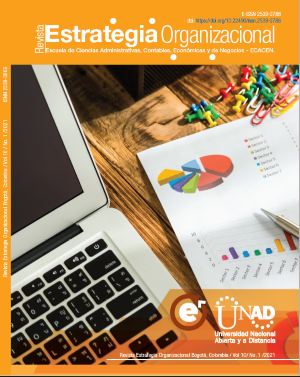COPYRIGHT AND OPEN ACCESS POLICY
Journal
The journal provides immediate open access to its content, based on the principle of giving the public free access to research and contributing to a greater global exchange of knowledge.
Therefore, it publishes under the Creative Commons 4.0 Attribution – Non-Commercial - Share-alike (BY-NC-SA) license: Commercial use of the original work or of possible derived works is not allowed, the distribution of which must be performed with a license equal to that which regulates the original work. To see more go to: http://creativecommons.org/licenses/by-nc-sa/4.0/
The journal allows self-archiving after publication with the version edited by the journal, both on personal websites and institutional repositories of the same area of knowledge, as long as the journal is directly cited and the URL leading to the article is given in the journal's Web space. The journal does not request any kind of forfeit of the managed content.
For all management, the Revista Estrategia Organizacional adheres to the COPE Code of Conduct for Journal Editors along with some COPE Best Practices Guidelines. The journal’s Code of Ethics can be found at:
http://selloeditorial.unad.edu.co/images/Documentos/OJS/ECACEN/C%C3%B3digo_de_%C3%A9tica.pdf
Author
The content of the article must be unpublished, it must not be in the process of evaluation by another institution, it must not have been distributed to third parties, there must be no legal or contractual limitation that prohibits the author from authorizing the use of their work in open access and in printed or digital form.
Obtaining reproduction rights for all graphical material (tables, figures, diagrams, photographs) is the responsibility of the authors. Therefore, they must send authorizations for the publication and use of this material.
Each author must sign the ‘Copyright Transfer Agreement’, transferring the rights to Universidad Nacional Abierta y A Distancia (UNAD) and the Revista Estrategia Organizacional.
The authors of the articles selected for publication must read and know the journal's code of ethics. In all cases, the Editor and Editorial Committee declare that the opinions expressed are the sole responsibility of the authors.
Preservation policy
Our journal preserves files through the servers of the UNAD newspaper library with the OJS platform. It has the PKP PLN tool that allows preserving the content of the journal regardless of where it is hosted. Thanks to the LOCKSS Private Network. The information can be expanded at: https://pkp.sfu.ca/2016/08/08/pkp-lockss-pln-update
Additionally, the journal has OAI-PMH interoperability protocols: Open Archives Initiative-Protocol for Metadata Harvesting. Details can be found at the following link: https://hemeroteca.unad.edu.co/index.php/revista-estrategica-organizacio/oai.
The Participatory Guarantee System (SPG) as an administrative strategy in the rural coffee-growing territories of Cauca, Colombia
Introduction: The peasant economy, agroecological production, the relationship between grassroots social organizations, resilience to climate change and food sovereignty, are practices and proposals that are strengthened in the coffee territories of the department of Cauca, Colombia. However, in the first territorial scale, the farm as an integrated production system, and in a second, the territory; The socio-economic dynamics of Cauca coffee farming are incipient in relation to the own certifications that allow mitigating the problems of marketing agroecological and organic products, and strengthening the direct relationship between producers and consumers. Methodology: That is why this study proposes a route towards a Participatory Guarantee System (SPG), as a strategy and certification tool for local agri-food products where the collective action of the communities is highlighted, ties are consolidated of trust between producers and consumers, inducing new theories of organizational and territorial management. Cauca coffee growers not only produce coffee, their local economy is part of the commercialization of other products from their farms; and currently in conventional markets where they generally participate, their products are not being recognized by consumers as made with agroecological practices. As a reference to generate the route, two experiences were systematized in SPG, from the departments of Risaralda and Valle del Cauca, in Colombia, which are led by agroecological farmers in the region. Results: In this Participatory Action-Research (PAR) modality, it was possible to highlight success factors for the implementation of a PGS and qualitatively analyze the systematized case study. In the case of Caucanos coffee growers, there is a need to explore the identification of commercial circuits that allow them to sell their products in channels that reduce the participation of intermediaries and bring the producer closer with a sale based on direct consumer confidence.








